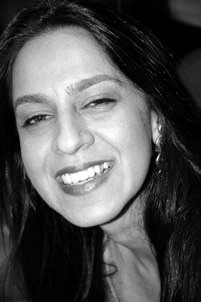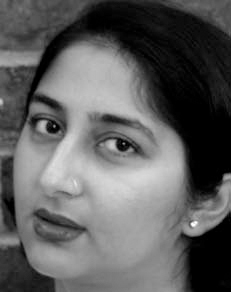And the World Changed (40 page)
Read And the World Changed Online
Authors: Muneeza Shamsie

But the best awaited him at the back. Here was the most beautiful woman Salaamat had ever seen. She had eyes the size of his palm, a sensuous nose, and plum-like lips half hidden behind a flimsy cloth held in a henna-dipped hand. On her right side was written, “Look. But with Love.” She did exactly that to him.
Salaamat was spellbound. The harder he stared the more certain he felt that she blinked, then blinked again. Her lips twitched in a smile she attempted to restrain, but failing that, she covered more of her face with the transparent
dupatta
.
“Ah, I see you've met Rani,” said a voice. Salaamat forced himself away from the picture. It was Chikna. “She's a naughty one, I'd be careful. And don't let Hero see you get too close. He's very jealous.”
“Hero?”
“Him,” Chikna pointed to the skinny man who was painting two buses down. “You two already started on the wrong foot. And now Rani seems to find you as pretty as I do.” He tilted his head and raised a brow saucily.
“What does Hero do here?” asked Salaamat.
“He's our painter. He made Rani. He loves everything he does. He's in love with himself.” Chikna tweaked Rani's cheek roughly.
Salaamat had to stop himself from fighting him for he could see Rani wince. “I want to make a bus just like this one,” he blurted. “I want to learn to make all these things. Including her.” Rani hid behind her cloth and Chikna threw his bald head back and laughed.

Humera Afridi

Humera Afridi (1971â ) is a New York-based writer of Pakistani origin. She was born in Lahore, spent her early years in Karachi, and left Pakistan at twelve with her parents for the United Arab Emirates. She earned her degrees in the United States at Mount Holyoke College and Carnegie Mellon University, and was the recipient of a New York Times Fellowship at New York University where she earned an MFA in
creative writing. Her work has appeared in the
New York Times
and several anthologies, including
Leaving Home
(Oxford University Press, 2001),
110 Stories: New York Writes after September 11
(NYU Press, 2003), and
Shattering the Stereotypes
(Olive Branch, 2005). Currently, she is finishing her first novel and teaching at Western Connecticut State University.
She says that she “endeavors to capture the dissonance that arises from the incommensurable worlds” her characters inhabit. As a woman belonging to the Pathan Afridi tribe, she carries with her the consciousness that she, “a northern Pakistani tribal outcaste walks the streets of New York” while her ancestral home on the borders of Pakistan and Afghanistan is often described as the “world's most dangerous place.”
Set in New York a few days after 9/11, “The Price of Hubris,” a version of which first appeared as “Circumference” in
110 Stories: New York Writes After September 11
, welds the crisis of the bombed city with the pain of a young Pakistani American woman who finds herself abandoned by her lover and regarded as an enemy in New York. In the story, the young woman is confronted with the post-9/11 prejudices that blame all Muslims for the attack on New York and consider all dark-skinned foreigners Muslims. Alienated from distant Pakistan, she makes an attempt to bond with fellow New York Muslims and faces yet another exclusion, this time in the mosque, where Muslim women are not allowed to participate in congregational prayers.
⢠⢠â¢
The woman has trained herself to wake up to precise images: aquamarine sea, limestone villas, sand the color of caramel custard, and a canteen crackling with newspapers and conversation. For a week now, she has awakened to this collage of all the beaches she has known.
Each morning the dream fills the barren plain that has been her mind since he left exactly one week ago; each morning the dream dissipates more quickly. She uncurls herself from her
ajrak
duvet. The yellow of pomegranate rinds and the warm reds of madder that had thrilled her when she bought the block-print
comforter from a handicraft store are invisible now. She reaches for the remote and turns on her radio. She has no television; she is still new here.
Less than a mile from where she lives there is a world destroyed, mangled, spitting fumes of burned steel, flesh, and plastic.
The price of hubris
, the radio announcer posits, based on a comment made by a right-wing televangelist. The woman slides her feet out of bed but keeps her head on her pillow and listens. Today has been declared a national day of prayer and mourning. The barricade north of Houston Street has been lifted. She is free to roam beyond the circumference of the five square blocks where she has been zoned for the last four days since the attack. Anxiety prickles at her, anxiety about this strange new freedom.
She has three tea bags leftâshe has been conserving her rations as there have been no deliveries below 14th Streetâand she steeps one now in a white mug and slips on her jeans and prepares to venture beyond the frontier. She will buy her first newspaper; she will buy sugar. She searches for her ID card, removes the stud from her nose.
Her loverâthough after this last time, could he really be called that?âsaid:
We should leave it at the level of skin. No telephone calls, no email.
This woman who had moved alone to the city three weeks ago cannot get her lover's words out of her head. She mutters them, remembering the breadth of him against her, wishing she'd said them first. She slings her surgical mask around her neck, rummages in her closet for a
dupatta
. She is not devout, nor one to carry the baggage of tradition, yet she gropes around for a scarf to cover her hair.
She thinks of her husband. He will call soon from the home they had shared till three weeks ago. She will miss the call. On the fourth day after this world was sabotaged, she knows that the other man, the one with whom she has this arrangement, this mutual exercising of lust, will not telephone. Each time, in the days following his visit, the sensation of his presence
dissipates, but now she does not let him out of her head. To do so will mean creating space for the horror outside.
Three people on her streetâall Caucasian. Smoke belches and curdles from the site, subsumes the neighborhood in an acrid haze. She positions her mask over her face and walks north. Two people pass her and glare. Is she imagining it? On the first afternoon, a woman outside the deli said,
These fucking Arabs! I don't understand them. Then, looking at her closely, said, You're not Arab, are you? I mean, you're not Palestinian?
At Houston Street she shows her ID to a South Asian police officer, forces a pinched smile. People cluster on either side of the blockade. As she crosses the street it feels as though she has left a country behind. Four men shove past her; one of them mutters something loud and incoherent.
Earnestness is not what the city is about and she wears her sin too close to her skin. She flags a cab,
11th Street and 1st Avenue, please.
She does not say Madina Masjid. The driver peers at her through the rearview mirror. He is brown and complicit. It is Friday, the day of communal prayer.
The woman feels she is driving through a palimpsest. A new city, an altered reality has layered the streets on which she has not been permitted to walk for the past few days. The few people out of doors cluster around posters of the missing, reading their lives, learning the maps of their bodies, the birthmarks and tattoos that render them unique. She wonders about the people alive, the ones putting up the posters, going from wall to wall with tape, watching the sky for rain.
The car stops at a red light. She cannot believe that the man who fucked her seven days ago hasn't bothered to email, to call. She cannot believe she is thinking of him still and that she has thought more about him than at any other time, in any other year. She cannot believe she is becoming this sort of woman, the sort of woman who baffles her.
A voice rasps through the window:
I'm going to fucking kill Osama. I want you to know I'm going to get him.
Okay, okay, very good
, the driver says like he's soothing a colicky baby.
The man at the window looks at her, says:
I'm telling this cabbie here I'm going to kill Osama.
He has a scruffy orange beard, a thin pasty face. The light turns, the tires screech, the driver swears under his breath in Punjabi.
Once out of the cab she wraps her hair in her
dupatta
. There are three photographers and two white journalists in denim skirts and bright stockings. There are no Muslim women in sight. But it is Friday, she thinks, they must be inside. She approaches a man in a mustard kurta-pajama, asks for the women's entrance. He looks over the length of her body, tilts his head.
Why? Do you want to pray?
She disregards him and walks into the squat building. There is office carpeting, sheetrock walls; it smells like someone's cooking. There are only men. One says, Yes? as if she were a foreigner. It is evident to them she is not a mosque-goer; she lacks the protocol.
Where are the women, please?
No women here
, he says abruptly and opens the door to let her out.
Standing in front of this mosque she feels stripped to the bone. Shameless; adulteress; wine-drinker: Her jeans seem to say this to the men, as do her boots and the fact that she is here alone on a day when the women are secure at home.
You are here, she thinks, in this city, among things and people, vehicles and street vendors, but you cannot say a word. The sins of this life seem as flat as copper pennies ground under heeled boots, worthless as vanity, lost in dirt. There is a sudden newness to the street, there is a sudden stark separation of the soul from the world that sifts around and through the body. You are here, she thinks. When you awake tomorrow, and the day after, and the day after that, this is where you will be.

Soniah Kamal

